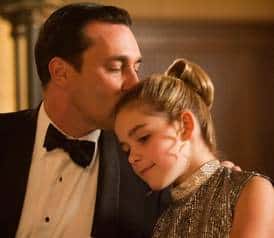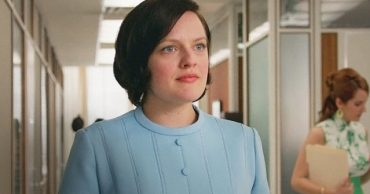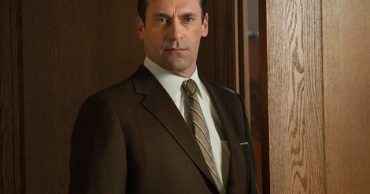
"Don't EVER grow up to be like me."
I have settled into a habit this season, one that I suspect is not unknown to fellow viewers, but certainly is unknown to viewers of any other show–I don’t look up the title of a Mad Men episode until long after the show is over.
The importance of titles to Mad Men is another facet of Matthew Weiner’s literary leanings. Sure every television series’episodes are titled, but few carry the same kind of weight, provide deeper insight, or allow for profitable rumination than this one–similar post-episode homework on a show like The Big Bang Theory may yield passing wisdom into certain strains of scientific supposition, none more eye-opening than the paradox of a show about ‘smart’people that is so staggeringly stupid (And cartoonish. And vapid. Don’t forget profoundly and unforgivably laugh-free. And yet, somehow, self-satisfied.)
Part of the allure of Mad Men is that can withstand a critical appraisal, and is such good goddamn TV that it demands it. I say this because I truly love the show, but when I sit down to write about it (this season, at least) I feel like I spend more time on wet-faced raspberries than roof-rattling huzzahs. But when a show is this good, it only gets better the more you dig.
Which brings me back to the titles. I’m sure that a good deal of my post-episode investigation regarding the titles stems from the lack of inclusion in the show itself. You’d think that for a show that places so much thematic weight on the title, and aims so hard at a literary target, that they’d include the title at the episode beginning–white letters on a black screen signifying the beginning less of another episode than a new chapter.
That said, I like having that carrot waiting for me at the end of each show. ‘Signal 30’and ‘Far Away Places’have their concrete place in each respective episode, but ‘At the Codfish Ball’is such an oblique title that it almost benefits from less investigation and more cogitation.
It nicely sums up the award party that Don and family attend at the episode’s end. A collection of characters who are left grappling with a disenchantment that no one else at the table can truly understand. Don seems (oddly) deflated by the side-swipe he receives from Ken Cosgrove’s father-in-law Ed Baxter (Ray Wise). The man shoots down Don’s (again, oddly) naive belief that the award being given to him (for his lacerating full-page letter set upon American Tobacco) will lead to more business by telling him that no none will want to work with him after he’s ‘bitten the hand that feeds’so publically.
Megan’s parents are in the middle of a slow-burn dissolution of their marriage (played with acidic perfection by Ronald Guttman and Julia Ormond). Megan doesn’t seem all that disenchanted with the Edward Albee-level of marital fustigation displayed by her parents (interesting to note that Albee was also name checked in this episode when Don offered to get the Heinz executive and his wife tickets to his new play–most certainly A Delicate Balance, another blistering portrait of matrimonial malaise). No, she’s seen it before and thinks they’ll get past it. Worse is the skewering Megan receives from her socialist-intellectual father, reacting poorly to the affluence that surrounds his daughter and her new husband. It leaves a mark, but it speaks more about her father’s disappointment with his floundering publishing career than true dismay at his daughter’s choices in life–he might make a good point about her turning her back on her passions, but Megan has moved from a model to a copywriter, surely a more creatively fulfilling endeavour. And while Megan might understand that as she lays in bed later that night, at the moment a jab from one’s father still lands with precision.
Then there’s Sally–this is where I get to the raspberry versus huzzah part of the program.
As a character, Sally continues to develop into an astonishing character one, who even at a young age, is as capable of cruelty as she is of kindness (a trait she comes by honestly–thanks Dad). As a performance, Kiernan Shipka continues to amaze. The whole Sally Draper situation puts me in mind of The Piano, the 1993 film from director Jane Campion that received as many jeers as accolades for what some perceived to be an impossibly self-aware child in the character of Flora McGrath (a performance that won eleven year-old Anna Paquin a Best Supporting Actress Oscar, lest we forget).
Luckily, I haven’t heard as much in the way of derision with Sally Draper’s development as a fully- if not altogether sympathetically-drawn character. In comparing it to The Piano¸ I think we see the advantage of a serialized drama over a feature film–characters are allowed room to breathe and develop. The audience can watch Sally (or any character) conduct herself in ways both admirable and despicable and not become bogged down in judgments by keeping in mind that a larger portrait is being painted. In a feature, a young girl can betray her mother and we won’t see how the young woman deals with the fallout. At the very least, we aren’t allowed to see her help an elderly lady across the street a year later. As a result, judgment is easy.
(Sidebar for million dollar idea: once Mad Men is done its run, there’s a spin-off featuring Sally Draper, in her late teens, volunteering with an organizing committee for the American bicentennial. It’s all post-Watergate cynicism and mountains of blow.)
Sally has started the bumpy ride to young womanhood and likely isn’t as ready for it as she thinks. She might roll her eyes at Don’s insistence that she remove her make-up and go-go boots before attending the award ceremony, but when she staggers back to the table after seeing Megan’s mother Mme. Calvert bury her head in Roger Sterling’s lap, it’s hard not to agree with Don. Although like everyone else at the table, Sally will keep her disenchantment to herself.
Here’s my issue with this part of the episode, or with any dramatic writing. When a character ‘stumbles’upon an important event, red flags circle my head so fast I can’t see the screen. Let’s put aside the inconsistency of Megan accompanying the Heinz executive’s wife to the powder room but allowing the pre-teen Sally saunter into a bathroom in the middle of a busy party–we’ll chalk it up to a generational discordance, one before ‘street proofing’kids was a catch phrase. And we can even put aside the fact that the only room we see Sally walk into is the one that features a ‘dirty’snapshot upon which the continuing erosion of her innocence hinges–we’ll say that’s a dramatic distillation of events. But the fact that Sally just happens upon this scene in toto is almost unforgivable. It wouldn’t have been difficult to make it less plodding–Roger had been acting as her dashing date, so we could have easily believed her spying Roger and Megan’s mother leaving the room in a wake of lustful glances and trailing them to their seedy tryst out of an inchoate sense of romantic betrayal. Instead, Sally just walks in on the scene, convenient as you please.
Episode author Jonathan Igla (writer of the season four ender ‘Tomorrowland’) is in good company. A dramaturgical heavyweight like David Mamet is prone to this ‘happy accident’mode of storytelling, a crutch all the more distressing considering the skill that surrounds this (generally act two-ending) blunder. House of Games, Homicide, Redbelt–they all suffer from the same poor plotting of a protagonist fortuitously overhearing/espying a vital plot development. Igla should take comfort in one major difference (because I’m sure he’s reading this and taking my sentiments to heart): Mamet’s characteristic fumble is present for no greater aim than to move the plot along. At least in the case of this episode, it leads to a greater characterization of an already well-drawn player in the drama. While that make it easier to swallow, it doesn’t make the move any less lazy and ill-suited for an elegant drama such as Mad Men.
In the end, it is Sally who resonates at episode’s end. Not just for the fact that telephone conversations between her and the endearingly creepy Glen Bishop (played with increasing precision by Matthew Weiner’s son, Marten) bookend the episode. For me, it comes down the title question: in this case, a clip I found on line of Shirley Temple singing ‘At the Codfish Ball’: while the performance is classically adorable, I can’t help think of a young girl forced to perform beyond her years, shoulder the burden of carrying a feature film, and providing for the family that surrounds her. While the connection to Sally Draper isn’t direct, I can’t help but look at her and think that she’s going to age beyond her years in the coming seasons.
Especially if I that spin-off idea gets some traction.
 Follow Us
Follow Us



